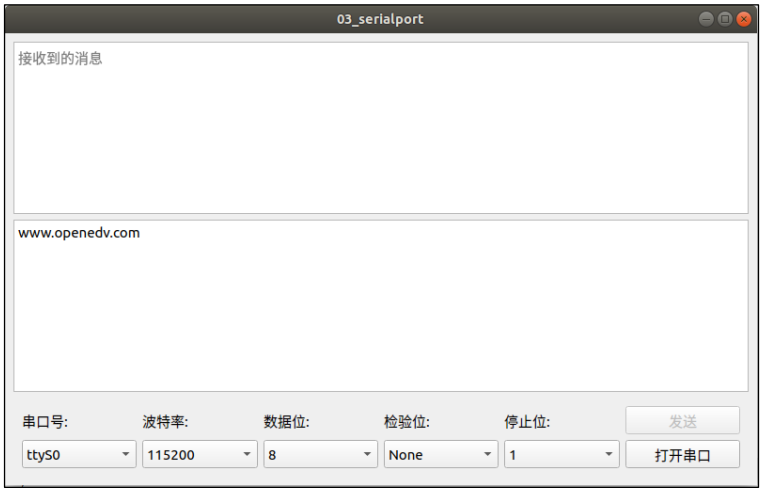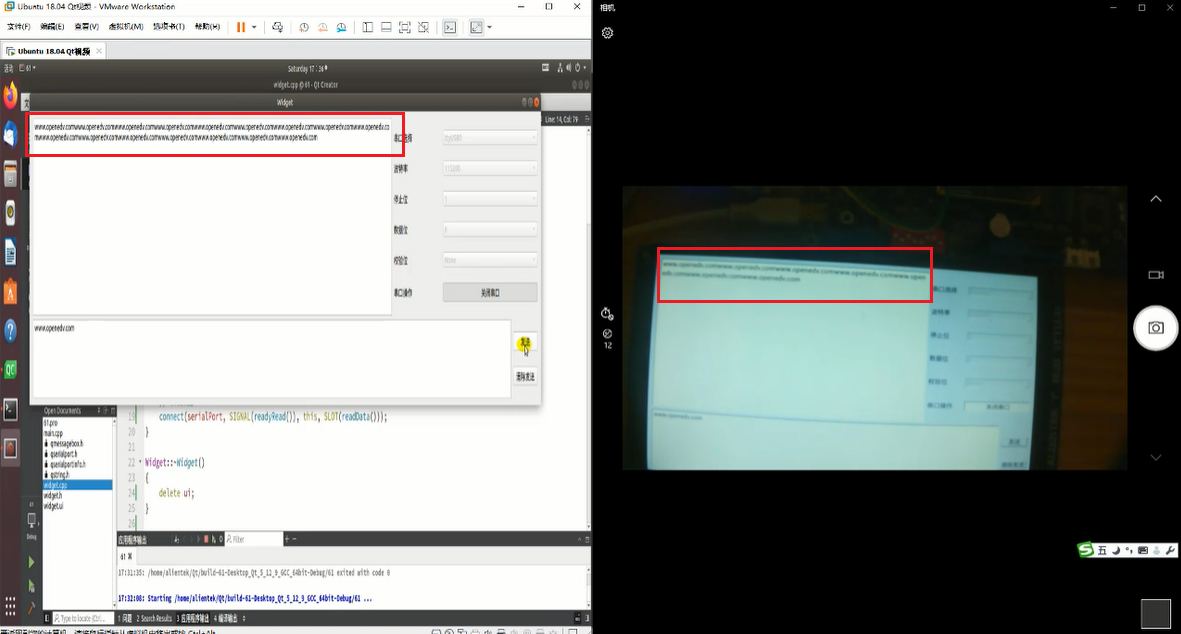真正串口通讯所需的功能是比较多的,此处的上位机只实现发送和接收功能。因为Linux、windows和开发板上均有串口,所以所开发的上位机在其上都是可以运行的。
文章目录
1. 资源简介
在正点原子的 I.MX6U 开发板的出厂系统里,默认已经配置了两路串口可用。一路是调试串口UART1(对应系统里的节点/dev/ttymxc0),另一路是UART3(对应系统里的节点/dev/ttymxc2)。由于 UART1 已经作为调试串口被使用。所以我们只能对 UART3 编程,(如需要使用多路串口,请自行设计底板与系统)。
2. 应用实例
2.1 项目简介:
Qt 串口的使用示例,应用到正点原子 I.MX6U 开发板上。
2.2 03_serialport.pro
在 03_serialport.pro 里, 我们需要使用串口,需要在 pro 项目文件中添加串口模块的支持,如下。
1 # 添加串口模块支持
2 QT += core gui serialport
3 4
greaterThan(QT_MAJOR_VERSION, 4): QT += widgets
5 6
CONFIG += c++11
7 8
# The following define makes your compiler emit warnings if you use
9 # any Qt feature that has been marked deprecated (the exact warnings
10 # depend on your compiler). Please consult the documentation of the
11 # deprecated API in order to know how to port your code away from it.
12 DEFINES += QT_DEPRECATED_WARNINGS
13
14 # You can also make your code fail to compile if it uses deprecated APIs.
15 # In order to do so, uncomment the following line.
16 # You can also select to disable deprecated APIs only up to a certain
version of Qt.
17 #DEFINES += QT_DISABLE_DEPRECATED_BEFORE=0x060000 # disables all the
APIs deprecated before Qt 6.0.0
18
19 SOURCES += \
20 main.cpp \
21 mainwindow.cpp
22
23 HEADERS += \
24 mainwindow.h
25
26 # Default rules for deployment.
27 qnx: target.path = /tmp/$${TARGET}/bin
28 else: unix:!android: target.path = /opt/$${TARGET}/bin
29 !isEmpty(target.path): INSTALLS += target
第 2 行,添加的 serialport 就是串口模块的支持。
2.3 mainwindow.h
在头文件“mainwindow.h”的代码如下。
1 #ifndef MAINWINDOW_H
2 #define MAINWINDOW_H
3 4
#include <QMainWindow>
5 #include <QSerialPort>
6 #include <QSerialPortInfo>
7 #include <QPushButton>
8 #include <QTextBrowser>
9 #include <QTextEdit>
10 #include <QVBoxLayout>
11 #include <QLabel>
12 #include <QComboBox>
13 #include <QGridLayout>
14 #include <QMessageBox>
15 #include <QDebug>
16
17 class MainWindow : public QMainWindow
18 {
19 Q_OBJECT
20
21 public:
22 MainWindow(QWidget *parent = nullptr);
23 ~MainWindow();
24
25 private:
26 /* 串口对象 */
27 QSerialPort *serialPort;
28
29 /* 用作接收数据 */
30 QTextBrowser *textBrowser;
31
32 /* 用作发送数据 */
33 QTextEdit *textEdit;
34
35 /* 按钮 */
36 QPushButton *pushButton[2];
37
38 /* 下拉选择盒子 */
39 QComboBox *comboBox[5];
40
41 /* 标签 */
42 QLabel *label[5];
43
44 /* 垂直布局 */
45 QVBoxLayout *vboxLayout;
46
47 /* 网络布局 */
48 QGridLayout *gridLayout;
49
50 /* 主布局 */
51 QWidget *mainWidget;
52
53 /* 设置功能区域 */
54 QWidget *funcWidget;
55
56 /* 布局初始化 */
57 void layoutInit();
58
59 /* 扫描系统可用串口 */
60 void scanSerialPort();
61
62 /* 波特率项初始化 */
63 void baudRateItemInit();
64
65 /* 数据位项初始化 */
66 void dataBitsItemInit();
67
68 /* 检验位项初始化 */
69 void parityItemInit();
70
71 /* 停止位项初始化 */
72 void stopBitsItemInit();
73
74 private slots:
75 void sendPushButtonClicked();
76 void openSerialPortPushButtonClicked();
77 void serialPortReadyRead();
78 };
79 #endif // MAINWINDOW_H
上面代码是在 mianwindow.h 里声明需要用到的变量,方法及槽函数。
2.4 mainwindow.cpp
mainwindow.cpp 的代码如下。
1 #include "mainwindow.h"
2 #include <QDebug>
3 #include <QGuiApplication>
4 #include <QScreen>
5 #include <QRect>
6 7
MainWindow::MainWindow(QWidget *parent)
8 : QMainWindow(parent)
9 {
10 /* 布局初始化 */
11 layoutInit();
12
13 /* 扫描系统的串口 */
14 scanSerialPort();
15
16 /* 波特率项初始化 */
17 baudRateItemInit();
18
19 /* 数据位项初始化 */
20 dataBitsItemInit();
21
22 /* 检验位项初始化 */
23 parityItemInit();
24
25 /* 停止位项初始化 */
26 stopBitsItemInit();
27 }
28
29 void MainWindow::layoutInit()
30 {
31 /* 获取屏幕的分辨率, Qt 官方建议使用这
32 * 种方法获取屏幕分辨率,防上多屏设备导致对应不上
33 * 注意,这是获取整个桌面系统的分辨率
34 */
35 QList <QScreen *> list_screen = QGuiApplication::screens();
36
37 /* 如果是 ARM 平台,直接设置大小为屏幕的大小 */
38 #if __arm__
39 /* 重设大小 */
40 this->resize(list_screen.at(0)->geometry().width(),
41 list_screen.at(0)->geometry().height());
42 #else
43 /* 否则则设置主窗体大小为 800x480 */
44 this->resize(800, 480);
45 #endif
46 /* 初始化 */
47 serialPort = new QSerialPort(this);
48 textBrowser = new QTextBrowser();
49 textEdit = new QTextEdit();
50 vboxLayout = new QVBoxLayout();
51 funcWidget = new QWidget();
52 mainWidget = new QWidget();
53 gridLayout = new QGridLayout();
54
55 /* QList 链表,字符串类型 */
56 QList <QString> list1;
57 list1<<"串口号:"<<"波特率:"<<"数据位:"<<"检验位:"<<"停止位:";
58
59 for (int i = 0; i < 5; i++) {
60 label[i] = new QLabel(list1[i]);
61 /* 设置最小宽度与高度 */
62 label[i]->setMinimumSize(80, 30);
63 /* 自动调整 label 的大小 */
64 label[i]->setSizePolicy(
65 QSizePolicy::Expanding,
66 QSizePolicy::Expanding
67 );
68 /* 将 label[i]添加至网格的坐标(0, i) */
69 gridLayout->addWidget(label[i], 0, i);
70 }
71
72 for (int i = 0; i < 5; i++) {
73 comboBox[i] = new QComboBox();
74 comboBox[i]->setMinimumSize(80, 30);
75 /* 自动调整 label 的大小 */
76 comboBox[i]->setSizePolicy(
77 QSizePolicy::Expanding,
78 QSizePolicy::Expanding
79 );
80 /* 将 comboBox[i]添加至网格的坐标(1, i) */
81 gridLayout->addWidget(comboBox[i], 1, i);
82 }
83
84 /* QList 链表,字符串类型 */
85 QList <QString> list2;
86 list2<<"发送"<<"打开串口";
87
88 for (int i = 0; i < 2; i++) {
89 pushButton[i] = new QPushButton(list2[i]);
90 pushButton[i]->setMinimumSize(80, 30);
91 /* 自动调整 label 的大小 */
92 pushButton[i]->setSizePolicy(
93 QSizePolicy::Expanding,
94 QSizePolicy::Expanding
95 );
96 /* 将 pushButton[0]添加至网格的坐标(i, 5) */
97 gridLayout->addWidget(pushButton[i], i, 5);
98 }
99 pushButton[0]->setEnabled(false);
100
101 /* 布局 */
102 vboxLayout->addWidget(textBrowser);
103 vboxLayout->addWidget(textEdit);
104 funcWidget->setLayout(gridLayout);
105 vboxLayout->addWidget(funcWidget);
106 mainWidget->setLayout(vboxLayout);
107 this->setCentralWidget(mainWidget);
108
109 /* 占位文本 */
110 textBrowser->setPlaceholderText("接收到的消息");
111 textEdit->setText("www.openedv.com");
112
113 /* 信号槽连接 */
114 connect(pushButton[0], SIGNAL(clicked()),
115 this, SLOT(sendPushButtonClicked()));
116 connect(pushButton[1], SIGNAL(clicked()),
117 this, SLOT(openSerialPortPushButtonClicked()));
118
119 connect(serialPort, SIGNAL(readyRead()),
120 this, SLOT(serialPortReadyRead()));
121 }
122
123 void MainWindow::scanSerialPort()
124 {
125 /* 查找可用串口 */
126 foreach (const QSerialPortInfo &info,
127 QSerialPortInfo::availablePorts()) {
128 comboBox[0]->addItem(info.portName());
129 }
130 }
131
132 void MainWindow::baudRateItemInit()
133 {
134 /* QList 链表,字符串类型 */
135 QList <QString> list;
136 list<<"1200"<<"2400"<<"4800"<<"9600"
137 <<"19200"<<"38400"<<"57600"
138 <<"115200"<<"230400"<<"460800"
139 <<"921600";
140 for (int i = 0; i < 11; i++) {
141 comboBox[1]->addItem(list[i]);
142 }
143 comboBox[1]->setCurrentIndex(7);
144 }
145
146 void MainWindow::dataBitsItemInit()
147 {
148 /* QList 链表,字符串类型 */
149 QList <QString> list;
150 list<<"5"<<"6"<<"7"<<"8";
151 for (int i = 0; i < 4; i++) {
152 comboBox[2]->addItem(list[i]);
153 }
154 comboBox[2]->setCurrentIndex(3);
155 }
156
157 void MainWindow::parityItemInit()
158 {
159 /* QList 链表,字符串类型 */
160 QList <QString> list;
161 list<<"None"<<"Even"<<"Odd"<<"Space"<<"Mark";
162 for (int i = 0; i < 5; i++) {
163 comboBox[3]->addItem(list[i]);
164 }
165 comboBox[3]->setCurrentIndex(0);
166 }
167
168 void MainWindow::stopBitsItemInit()
169 {
170 /* QList 链表,字符串类型 */
171 QList <QString> list;
172 list<<"1"<<"2";
173 for (int i = 0; i < 2; i++) {
174 comboBox[4]->addItem(list[i]);
175 }
176 comboBox[4]->setCurrentIndex(0);
177 }
178
179 void MainWindow::sendPushButtonClicked()
180 {
181 /* 获取 textEdit 数据,转换成 utf8 格式的字节流 */
182 QByteArray data = textEdit->toPlainText().toUtf8();
183 serialPort->write(data);
184 }
185
186 void MainWindow::openSerialPortPushButtonClicked()
187 {
188 if (pushButton[1]->text() == "打开串口") {
189 /* 设置串口名 */
190 serialPort->setPortName(comboBox[0]->currentText());
191 /* 设置波特率 */
192 serialPort->setBaudRate(comboBox[1]->currentText().toInt());
193 /* 设置数据位数 */
194 switch (comboBox[2]->currentText().toInt()) {
195 case 5:
196 serialPort->setDataBits(QSerialPort::Data5);
197 break;
198 case 6:
199 serialPort->setDataBits(QSerialPort::Data6);
200 break;
201 case 7:
202 serialPort->setDataBits(QSerialPort::Data7);
203 break;
204 case 8:
205 serialPort->setDataBits(QSerialPort::Data8);
206 break;
207 default: break;
208 }
209 /* 设置奇偶校验 */
210 switch (comboBox[3]->currentIndex()) {
211 case 0:
212 serialPort->setParity(QSerialPort::NoParity);
213 break;
214 case 1:
215 serialPort->setParity(QSerialPort::EvenParity);
216 break;
217 case 2:
218 serialPort->setParity(QSerialPort::OddParity);
219 break;
220 case 3:
221 serialPort->setParity(QSerialPort::SpaceParity);
222 break;
223 case 4:
224 serialPort->setParity(QSerialPort::MarkParity);
225 break;
226 default: break;
227 }
228 /* 设置停止位 */
229 switch (comboBox[4]->currentText().toInt()) {
230 case 1:
231 serialPort->setStopBits(QSerialPort::OneStop);
232 break;
233 case 2:
234 serialPort->setStopBits(QSerialPort::TwoStop);
235 break;
236 default: break;
237 }
238 /* 设置流控制 */
239 serialPort->setFlowControl(QSerialPort::NoFlowControl);
240 if (!serialPort->open(QIODevice::ReadWrite))
241 QMessageBox::about(NULL, "错误",
242 "串口无法打开!可能串口已经被占用! ");
243 else {
244 for (int i = 0; i < 5; i++)
245 comboBox[i]->setEnabled(false);
246 pushButton[1]->setText("关闭串口");
247 pushButton[0]->setEnabled(true);
248 }
249 } else {
250 serialPort->close();
251 for (int i = 0; i < 5; i++)
252 comboBox[i]->setEnabled(true);
253 pushButton[1]->setText("打开串口");
254 pushButton[0]->setEnabled(false);
255 }
256 }
257
258 void MainWindow::serialPortReadyRead()
259 {
260 /* 接收缓冲区中读取数据 */
261 QByteArray buf = serialPort->readAll();
262 textBrowser->insertPlainText(QString(buf));
263 }
264
265 MainWindow::~MainWindow()
266 {
267 }
第 29~121 行, 界面布局初始化设置,在嵌入式里,根据实际的屏的大小,设置全屏显示。
其中我们用到垂直布局和网格布局。
习布局内容,学以致用理解的时候到了。
第 123~130 行, 查找系统可用的串口, 并添加串口名到 comboBox[0]中。
第 132~144 行, 波特率初始化,预设常用的波特率, 115200 作为默认选项。 并添加波特率
到 comboBox[1]中。
第 146~155 行, 数据位项初始化,设置默认数据位为 8。
第 157~166 行, 校验位项初始化,默认无校验位。
第 168~177 行, 停止位项初始化,默认停止位为 1。
第 179~184 行, 发送数据,点击发送按钮时触发。
第 186~256 行, 打开或者关闭串口。以我们设置的项使用 Qt 串口提供的设置串口的方法
如 setDataBits(QSerialPort::DataBits)等,按第 188~239 行步骤设置完串口需要配置的参数就可以
打开或者关闭串口了。
第 258~263 行, 从缓冲区里读出数据,并显示到 textBrowser 里。
3. 程序运行效果
下面为 Ubuntu 上仿真界面的效果,请将程序交叉编译后到开发板运行,用串口线连接开发板的 UART3 到电脑串口,在电脑用正点原子的 XCOM 上位机软件(或者本程序亦可当上位机软件),设置相同的串口参数,选择串口号为 ttymxc2 (注意 ttymxc0 已经作为调试串口被使用了!),点击打开串口就可以进行消息收发了。默认参数为波特率为 115200,数据位为 8,校验为 None,停止位为 1,流控为关闭。

4. 串口测试
关于串口测试的硬件软件,请参考“01【正点原子】I.MX6U用户快速体验V2.6”
实际测试时,请参考Qt串口编程3-开发板验证,下图是实现了上位机与板卡连接的UI上位机的通讯。























 761
761











 被折叠的 条评论
为什么被折叠?
被折叠的 条评论
为什么被折叠?










